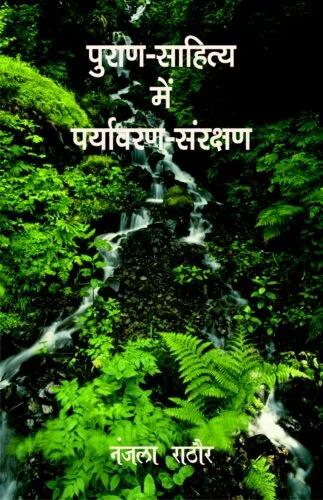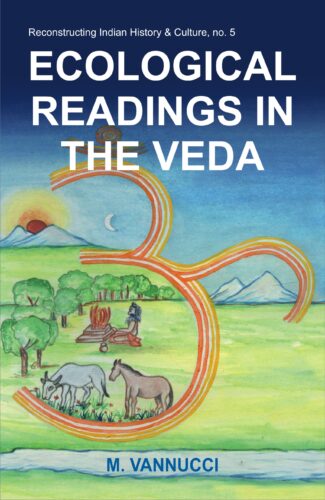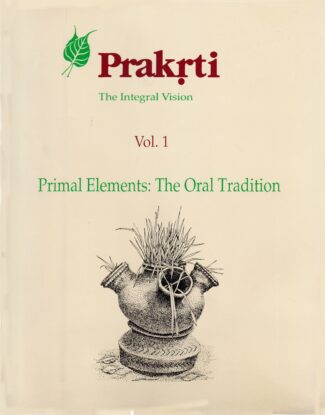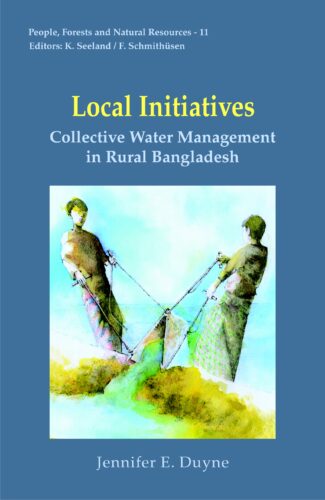

Purana Sahitya mein ...
Purana Sahitya mein Paryavaran Samrakshan
Environmental Protection in Pauranic Literature by: Nanjala RathoreHow important was environment in the ancient times as depicted in the Puranic literatures has been discussed in detail in this book.
₹300.00 Original price was: ₹300.00.₹270.00Current price is: ₹270.00.
ISBN: 9788186921180
Year Of Publication: 2001
Edition: 1st
Pages : xiv, 194
Bibliographic Details : Bibliography
Language : Hindi
Binding : Hardcover
Publisher: Decent Books
Size: 23 cm.
Weight: 450
How important was environment in the ancient times as depicted in the Puranic literatures has been discussed in detail in this book.

- Sale!Prakrti (Vol. 4) by: Kapila Vatsyayan
₹1,400.00Original price was: ₹1,400.00.₹1,260.00Current price is: ₹1,260.00.PRAKRTI : The Integral Vision explores the concept of the primal Elements (Sky, Air, Fire, Water, Earth, etc.) which has governed and determined the evolution of civilizations and cultures. This 5-volume collection is the outcome of a series of five successive but inter-locked seminars culminating into cross-cultural, multi-disciplinary understanding. The First Volume, Primal Elements: The Oral Tradition, focuses attention on the articulation of cohesive communities communicating with the Elements in continuous unceasing dialogue. To them the nature is not a matter of intellection; it is a question of life here and now. This is manifested in their primary myths and rituals which sacralize nature so that man can live as an integral part of the Universe. The Second Volume, Vedic, Buddhist and Jain Traditions, centres on the texts, probing deep into the Vedic rituals, Upanisadic philosophies and Jyotisa sastra. There is a prodigious consideration of the concept of maha-bhutas in Buddhism and Jainism. It also brings forth the many covergences and divergences of the view-points between and amongst these different streams of Indian thought. The Third Volume, The Agamic Tradition and the Arts, examines systematically the manifestation of the Elements in the Indian arts and their Agamic background. From the different vantage points of the architect, sculptor, painter, musician and dancer, the field is reopened here to discern the structure of the arts at its primal level. Experiences of the transformation of the gross to the subtle and the theories of aesthetics and cultural ecology emerge from such a captivating view-point. The Fourth Volume, The Nature of Matter offers a much-needed critical appraisal of modern scientific concepts with reference to traditional thoughts. It contains invaluable discussion on quantum theory and elementary particles, evolution of living matter, nature and function of matter, scientific philosophy and Buddhist thought, Sankhya theory of matter, ancient and medieval biology, mysticism and modern science, traditional cosmology, matter and medicine, matter and consciousness, etc. The dialogue created between the method of science and the method of speculation is invigorating. The Fifth Volume, Man in Nature, is a coming together of cultures and disciplines. Enchanting in their own way, the international community of scientists, philosophers, anthropologists, ecologists and artists, share in this volume the myths and cosmology of their respective societies and cultures. There emerges a most meaningful dialogue between those who live with the myths of primordial elements and those who have modified the tools of science to investigate the nature of matter. This 5-volume set, first of its kind, produced by the most distinguished specialists in the field, should enjoy a wide readership amongst philosophers of many different persuasions, scientists, theorists of art and culture, particularly ecologists and anthropologists seeking new insights into the phenomena of Nature.
- Sale!Ecological Readings in the Veda by: Marta Vannucci
₹600.00Original price was: ₹600.00.₹540.00Current price is: ₹540.00.The Vedas are indisputably among the oldest of mankinds documents. Which Dr. Marta Vannucci rummages through to address a highly enigmatic question: How man evolved as Man: thinking, discriminating, thought-communicating? Or, yet more specifically, how did he come to identify cause-effect relationships of living-beings: both among themselves and with their environment? In looking for answers, she discovers profound biological, physiological, and ecological insights in Vedic writings which she projects here, with coherent analyses and prolific textual references. Dr Vannucci, who has studied Indian sacred texts for about twenty years, is perhaps the first ever biologist to explore the ecological validity of Vedas. With her critical Florentine mind and five-decade-long involvement in scientific methodologies, she interprets the complex Vedic verses in her thematic effort to decipher the ancient code with a bio-ecological key -spelling out, contextually, the Matter-Energy principles (embodied in Lord Agni) and Life-Hope principles (personified by Lord Savitr). Also setting out a comparative perspective on Vedic expressions of ecology and its contemporary worldview, the author suggests that the essential difference between the two stems not from the perception of reality, but from the manner of their theorizing. It is a painstakingly documented work, with a large-scale glossary of Sanskrit/ technical words and extensive bibliographic references. And also a foreword by a cultural scholar of Dr Kapila Vatsyayans eminence.
- Sale!Prakrti (Vol. 1) by: Kapila Vatsyayan
₹1,400.00Original price was: ₹1,400.00.₹1,260.00Current price is: ₹1,260.00.PRAKRTI : The Integral Vision explores the concept of the primal Elements (Sky, Air, Fire, Water, Earth, etc.) which has governed and determined the evolution of civilizations and cultures. This 5-volume collection is the outcome of a series of five successive but inter-locked seminars culminating into cross-cultural, multi-disciplinary understanding. The First Volume, Primal Elements: The Oral Tradition, focuses attention on the articulation of cohesive communities communicating with the Elements in continuous unceasing dialogue. To them the nature is not a matter of intellection; it is a question of life here and now. This is manifested in their primary myths and rituals which sacralize nature so that man can live as an integral part of the Universe. The Second Volume, Vedic, Buddhist and Jain Traditions, centres on the texts, probing deep into the Vedic rituals, Upanisadic philosophies and Jyotisa sastra. There is a prodigious consideration of the concept of maha-bhutas in Buddhism and Jainism. It also brings forth the many covergences and divergences of the view-points between and amongst these different streams of Indian thought. The Third Volume, The Agamic Tradition and the Arts, examines systematically the manifestation of the Elements in the Indian arts and their Agamic background. From the different vantage points of the architect, sculptor, painter, musician and dancer, the field is reopened here to discern the structure of the arts at its primal level. Experiences of the transformation of the gross to the subtle and the theories of aesthetics and cultural ecology emerge from such a captivating view-point. The Fourth Volume, The Nature of Matter offers a much-needed critical appraisal of modern scientific concepts with reference to traditional thoughts. It contains invaluable discussion on quantum theory and elementary particles, evolution of living matter, nature and function of matter, scientific philosophy and Buddhist thought, Sankhya theory of matter, ancient and medieval biology, mysticism and modern science, traditional cosmology, matter and medicine, matter and consciousness, etc. The dialogue created between the method of science and the method of speculation is invigorating. The Fifth Volume, Man in Nature, is a coming together of cultures and disciplines. Enchanting in their own way, the international community of scientists, philosophers, anthropologists, ecologists and artists, share in this volume the myths and cosmology of their respective societies and cultures. There emerges a most meaningful dialogue between those who live with the myths of primordial elements and those who have modified the tools of science to investigate the nature of matter. This 5-volume set, first of its kind, produced by the most distinguished specialists in the field, should enjoy a wide readership amongst philosophers of many different persuasions, scientists, theorists of art and culture, particularly ecologists and anthropologists seeking new insights into the phenomena of Nature.
- Sale!Local Initiatives by: Jennifer E. Duyne
₹700.00Original price was: ₹700.00.₹630.00Current price is: ₹630.00.This book illustrates how people in rural Bangladesh, without any institutional or material support, manage their water resources to make their environment safer or more productive. Case studies of over seven hundred local initiatives show that people have an underestimated capacity to design, construct, maintain and operate relatively complex water management systems and to mobilise large amounts of human, material and financial resources. They are neither passive victims of their environment, nor merely responding or reacting to programmes or services provided by outside agencies. It was found, however, that the capacity to organise is much higher in some regions of Bangladesh than in others. This leads the author to examine conditions under which people get together to pursue common goals through a systematic, comparative analysis of the four regions covered by the research project. The findings are further reviewed against the backdrop of academic and policy debates on collective action, participation, and management of common property resources.
- Sale!Indigenous Knowledge, Forest Management and Forest Policy in South Asia by: Klaus Seeland, Franz Schmithusen,
₹750.00Original price was: ₹750.00.₹675.00Current price is: ₹675.00.Reflecting the latest findings of a large research project that began about a decade ago this volume, the 5th in the ongoing Man and Forest series, highlights the relevance of indigenous knowledge of various South Asian tribal and rural communities in the sustainable management of forests and local resources more specially against the growing challenges of economic development vis-a-vis environmental hazards and a declining resource base. Not only the volume reiterates the relevance of indigenous knowledge as a development tool in this age of standardized, modern know-how applications, but also illustrates its enormous impact on the social development in tribal and rural areas. Not just in India but in the adjacent countries of Nepal and Bhutan as well are analysed forest policy issues. In these countries, particularly in the current scenario of regulation, the authors emphasise of both collective initiatives at the grassroots level and securing the locally accepted patterns of livelihood for the tribal and village communities. The volume includes widely varied case studies on the role of indigenous knowledge in forestry, community living, and joint management of local natural resources. This book consists of 17 papers, based on cross-cultural, interdisciplinary investigations of well-known scholars of forest management, ethno-botanists, social anthropologists and of the members of several local NGOs involved in either community forestry or village development programmes.









